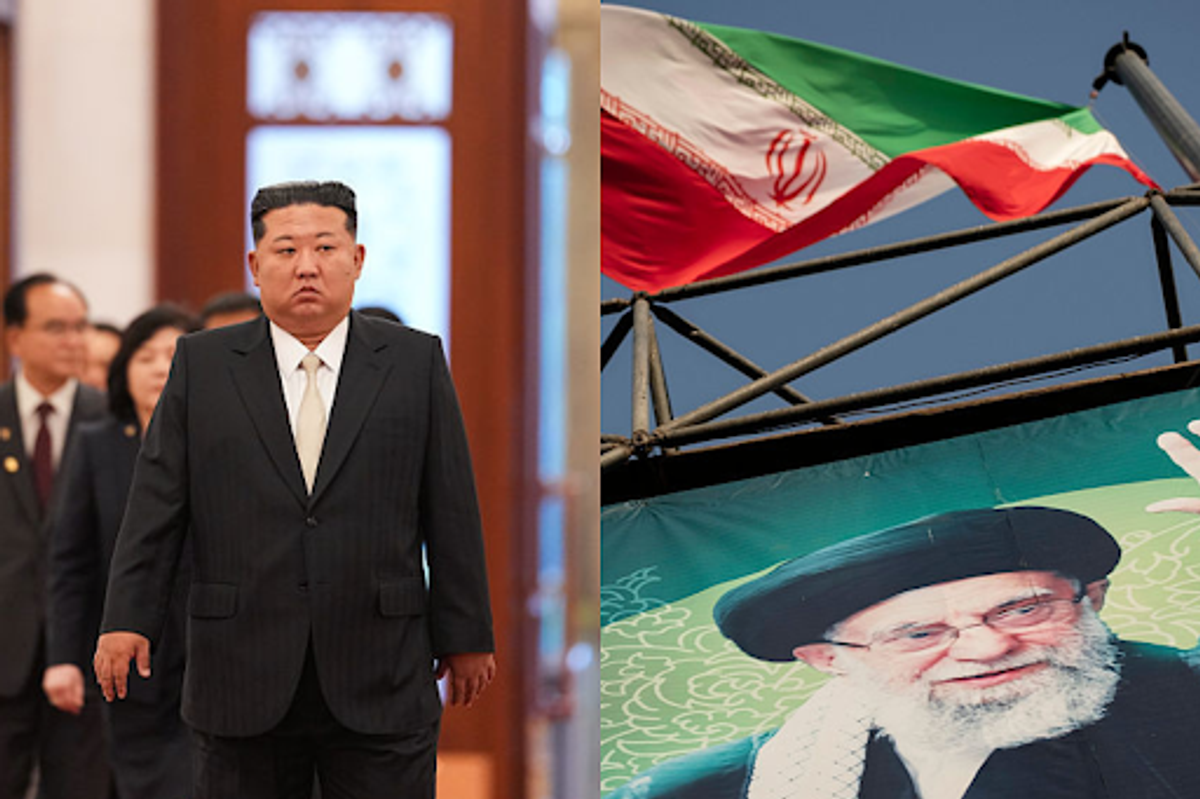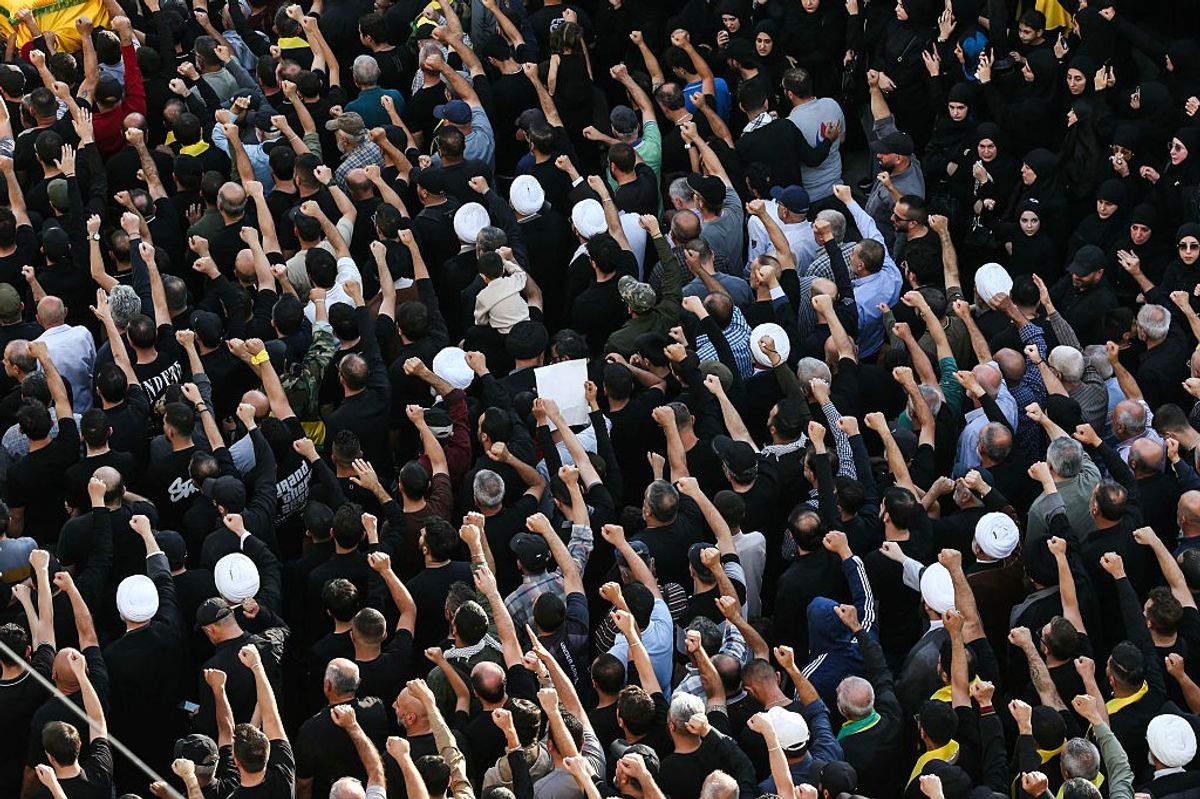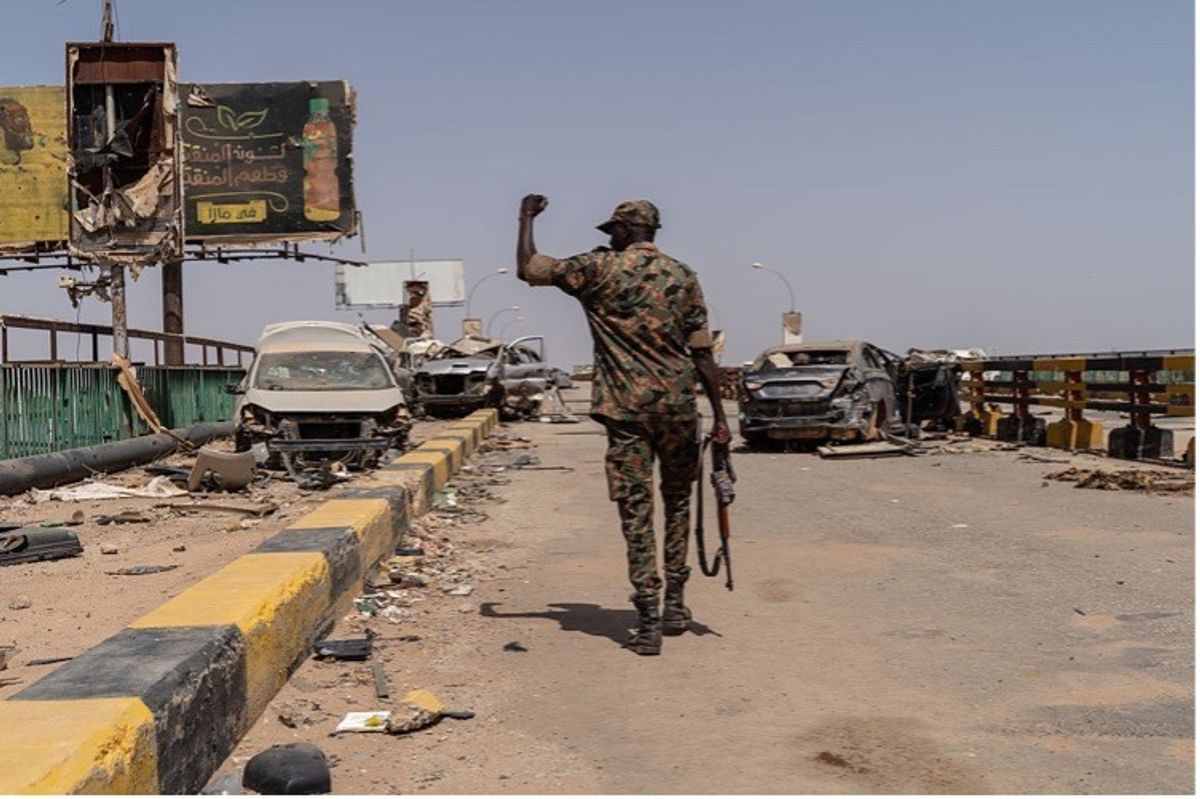BOTTOM LINE UP FRONT – Less than one week after Iran’s attack against Israel, Israel struck Iran early on Friday, hitting a military air base near the city of Isfahan, in central Iran. Iranian officials and media reported blasts at the base caused by drone strikes, and said that another group of drones had been shot down in the Tabriz region, some 500 miles north of Isfahan.
The initial reports suggested that the worst fears of the U.S. and other countries had - for now at least - not been realized. Iran said no Israeli planes had entered its airspace. Iranian news agencies made a point of noting that no nuclear facilities had been hit. There was no comment from the Israeli military, and no vows from the Iranian government of a retaliation. Earlier in the week, Iran's President Ebrahim Raisi had warned that “the tiniest act of aggression” on his country’s soil would draw a response.
It was unclear whether the drone attacks were Israel’s full answer to last weekend’s Iranian strikes. For the moment, the scope of Friday's strikes and the reactions in Israel and Iran suggested the Israeli retaliation had been limited, and perhaps meant to deescalate what a highly tense situation.
That tension had been sparked by an unprecedented series of events: the first military strike by Iran against Israel; a push by the U.S. and other countries to convince Israel to refrain from any retaliatory attack; and Israeli leaders saying they would ignore that advice. Prime Minister Benjamin Netanyahu vowed Wednesday that Israel would “do whatever is necessary to defend itself," and Yuli Edelstein, who chairs the Knesset Foreign Affairs and Defense Committee, said Israel would "teach [Iran] a lesson that you can’t attack a sovereign country just because you find it doable."
The global push for Israeli restraint began in the immediate aftermath of the Iranian strikes, when President Joe Biden spoke to Netanyahu and urged him to “take the win” - referring to the nearly flawless defense against Iran's assault. 99 percent of the incoming Iranian missiles and drones were intercepted, thanks to Israeli, American and British air defenses, and – notably – the participation of Israeli’s neighbor Jordan. Given that damage in Israel was minimal, a broad range of world leaders argued that an Israeli counterpunch was unnecessary, and could bring a conflagration.
Just prior to Friday's Israeli strikes, four Cipher Brief experts with deep experience in the Middle East weighed in on questions as consequential as any the region has faced in years: What were the options before Israel’s war cabinet as it considered its response? How and when might the response unfold? And how real were the risks of an Israeli war with Iran?
In an interview with CNBC, Cipher Brief expert General David Petraeus said, "This is an issue on which where you stand depends on where you sit." Gen. Petraeus, a former CIA director and top U.S. commander, added that "if you sit in Washington and you're worried that this could cause a spike in oil prices that could have a damaging effect on the global economy in an election year, then understandably you'd like to see restraint. On the other hand, if you’re in Tel Aviv and Jerusalem and you've just been attacked by Iran directly from their soil for the first time…they have a need, they believe, to show Iran that this is just not acceptable."
Petraeus said he was "more with the Israelis on this," in terms of the need to respond in some fashion.
"The threading the needle aspect of this (is), how do you do something that's significant, it's visible, it’s punitive, but it's not so punitive and so significant that the Iranians feel the need to respond in kind."
Another Cipher Brief expert, Admiral James Stavridis, a former top NATO commander, laid out four broad options he believed were under consideration in the Israeli war cabinet.
"One is go big. Major, major strikes. Jets whistling over Tehran. Go after the nuclear program. A big, big strike against the homeland," Adm. Stavridis said on MSNBC. "Option two, which is what I think we'll end up with, would be some level of response, probably against the homeland, but much more limited. Perhaps going after the manufacturing site for the drones or something that would smack of proportionality. So, a more limited strike but against the homeland."
He said the third option would involve strikes outside Iranian territory, either cyberattacks or military strikes against Iran's regional proxies, and the fourth a restrained, "high road" approach of the sort the U.S. and others are urging.
"If you ask me to bet where it lands, I think they'll do some combination of options two and three. There'll be some strike against a homeland target. That is almost irresistible for the Israelis. But they will certainly take that more limited package I described — cyber, maritime, special forces."
As of early Friday afternoon in the region, it appeared that Adm. Stavridis was at least partly right - though again, it remained unclear whether other Israeli responses were in the option.
Cipher Brief Managing Editor Tom Nagorski spoke on Thursday with two other Cipher Brief experts, Glenn Corn and Ralph Goff, former CIA agents with extensive experience in the Middle East. Corn and Goff also acknowledged the pressures in Israel to respond, but both worried that "cooler heads" in Israel might not prevail. Corn warned that a heavy Israeli retaliation would draw the U.S. "into a wider conflict in the Middle East...I don't want to see the United States drawn into a wider conflict that will further undermine our position both in the Middle East and internationally."
THE CONTEXT
- On April 1, an Israeli air strike on Iran’s consulate in Damascus killed seven Islamic Revolutionary Guard Corps (IRGC) commanders, including Brigadier General Mohammad Reza Zahedi, a senior commander in the IRGC Quds Force.
- On April 13, Iran and several of its regional proxies launched hundreds of missiles and drones at Israel.
- The attack caused minor damage at the Nevatim Airbase. There were no reported deaths, though a Bedouin girl was injured by shrapnel.
- Israel said 99 percent of the drones and missiles were shot down by Israeli air defenses and U.S., British, French, and Jordanian air and naval forces. Most of the Iranian projectiles were intercepted before entering Israeli airspace. Saudi Arabia and the United Arab Emirates shared intelligence with the U.S. and Israel ahead of the attack.
- Israel had vowed to retaliate against Iran. "The state of Israel will do whatever is necessary to defend itself,” Israeli Prime Minister Benjamin Netanyahu said. Iranian President Ebrahim Raisi warned that the "tiniest invasion" by Israel would bring a "massive and harsh" response.
THE EXPERTS
These interviews have been lightly edited for clarity.
The Cipher Brief: To the extent you can, take us inside those war cabinet deliberations in terms of what the options are for Israel, and the spectrum of possible retaliation.
Corn: The Israelis obviously have a completely different perspective than we would here in Washington. These threats to them are existential. They see the Iranians as threatening the existence of Israel, not just one attack or two attacks, but the complete existence of Israel.
I’m sure they have a list of options that they're looking at. Hopefully they will understand that they're in a winning position right now. In my own assessment, the Iranian attacks, not only did they not cause much damage to Israel, but in terms of what happened, the Iranians actually kind of looked bad. And the Israelis should “take the win” because they need that right now, after what happened on 7 October, that horrible terrorist attack. Their response in Gaza has gotten them a lot of criticism. It's caused a lot of problems for the Israelis politically. So now they have a chance for a little bit of a reset, and I think they should take advantage of it.
They can choose when and where they're going to respond. I'm not in Israel, so I can't say how much pressure the cabinet feels to take an immediate response, but I would hope that the Israeli people are not that bloodthirsty that they want such an immediate response.
Goff: I heard General Petraeus say that “where you stand depends on where you sit.” And that's very true. If you're sitting in the war cabinet, your stance says you have to do something. If you're sitting in the United States or the UK or somewhere in an allied country, you're thinking, well, maybe let's not strike. That said, the Israelis don't have to strike back right away. They can pick the time, they can pick the target, they can pick the means. They have a wide range of options here.
Corn: There's discussion of a cyberattack, or targeting Iranian shipping, maritime assets, or the IRGC (Iranian Revolutionary Guard Corps) personnel outside of Iran. And then of course, there's the option to strike something inside Iran, and what they decide to strike and how large the strike is important. I personally hope they don't respond with 300 missiles in response to what the Iranians did. If they feel they have to do something, it should be more symbolic. But I think they have to be very careful.
Goff: You've got a range of (Iranian) activities – the weapons program, you've got the IRGC as a target. You've got drone production capabilities, export capabilities of drones to Ukraine and to Russia for use in the Ukraine war. I mean, there's a wide range here.
The Cipher Brief: What might you counsel, if you are given the prerequisite that there must be a response, something that teaches a lesson? What might that look like?
Goff: I wish I could have a seat at that table and provide my free advice. However they strike back, Israelis have to carefully consider who they are holding responsible for this attack. This has gone up to the senior leadership of the Iranian government. So they have to find a way to punish those guys for the decision. They've already punished the IRGC with that strike on the diplomatic facility in Syria. So they've got to figure out, How do they do that? How do they send a message to the senior leadership without starting a war? That's going to be a tough balance.
I remember once speaking with some Israeli colleagues, remarking that for years they went after the (nuclear) enrichment program and there were assassinations, supply chain attacks, sabotage and diversion, and it was all designed to slow down and prevent enrichment of uranium to weapons. What was the end result? The Iranians sped it up. They improved their capabilities and they hardened their facilities.
So one could say that years of Israeli covert action against that program had the exact opposite result on enrichment, which means if they use that same playbook, why should they expect a different result with weaponization? So here again, in the case of revenge on the leadership of Tehran, the message you might intend to send may not be the message that gets received. So policymakers here and in Europe have a really legitimate reason to be concerned.
I think it's very important for the war cabinet now, that the cooler heads prevail. We saw the formation of a special war cabinet for Gaza in Israel with Defense Minister Gallant, where they excluded the far-right hotheads, if you will, from the Netanyahu regime, because they wanted to make more balanced tactical considerations against Gaza as opposed to politically driven tactics. So I'm hopeful that the war cabinet now is trying to assume a similar stance, but with Bibi (Netanyahyu) at the helm, politics is that man's life. So I worry that political considerations will be part of the deliberations in the war cabinet.
The Cipher Brief: One follow-up to the political point. There was a poll done by Hebrew University that said 74 percent of Israelis opposed a retaliatory strike if it would damage Israeli security alliances. Might that influence the deliberations?
Goff: I would certainly hope so. I hope that the cooler heads in the war cabinet are citing those statistics. And the nuances of the Iranian strike – they managed to keep a leash on their proxies. There were no attacks on U.S. forces, unlike previous rounds of tit-for-tat strikes. That's clear messaging from the Iranians that they were not looking to take on Central Command or the U.S. military. So these are important alliances that have given the Israelis not only a military card to play, but a diplomatic card to play also at a time of their choosing. To waste that would be a tragedy.
Corn: Again, I don't think the Iranians did much. And so at this point, the Israelis shouldn't be under great pressure to do some kind of massive response or very aggressive response. That's my personal opinion. And so when people say, “take the win,” my view of that win is, public-opinion wise, the Israelis need some kind of win, and they have a chance to have that right now by not responding in a way that will escalate further.
And we all have to understand that the war is not over. The Iranians are going to continue to target Israelis and the United States needs to stand with them. But the Israelis need to understand, too, that the United States is in a very difficult position now, and as their number one ally, they need to respect our sensitivities and be very wary of escalating. We don't need escalation right now. We have other things we have to deal with as well. Right now we're in a very dangerous situation in Ukraine. I don't want to change the subject, but we've got to stay focused on that fight as well.
The Cipher Brief: Is there a strategic advantage, assuming that there will be some sort of response, to waiting a while, in the sense that you keep your adversary on its toes?
Goff: That's a great point. Keeping your adversary on their toes and keeping them off balance is a great tactic. The Iranians had one major gain from their strike on Israel, and that was, they learned just how good Israeli defenses are. The Iranians have learned that they cannot just take for granted that they're going to punch through this defensive capability of the Israelis. So they've got to sit back and consider that. And while they're considering how they retool their attack capabilities, they're going to be on the defensive because they're not going to know what’s coming or when.
The Cipher Brief: What are the dangers if cooler heads don't prevail and the war cabinet chooses one of the more robust options, let's say multiple heavy strikes in Iran itself?
Corn: My primary concern is Lebanese Hezbollah and the arsenal that they have right on the Israeli border. As good as the air defense was in thwarting this Iranian attack, those strikes were coming from far away. Obviously, Hezbollah is right on the border, and they could probably inflict much more damage. And that will mean that the Israelis have to respond with a great deal of force in Lebanon. And I don't think Israel needs that war right now. That is my biggest concern.
Other things the Iranians could do – could they launch more attacks? Yes. Could they have some of their other proxies launch attacks? Yes. But to me, the most immediate and dangerous threat is the escalation of the situation between Israel and Lebanese Hezbollah.
Goff: I saw something in one publication accusing Bibi Netanyahu of guiding this entire crisis so that he could drag the United States into a war with Iran and be finished with the issue. I don't entirely agree with that, but there is enough of a track record with (Netanyahu) and his current political problems to suggest it would be irresponsible to say that's not possible. Here again, the Israelis have to be careful that if and when they launch a strike, they have to avoid civilian casualties. One thing I think we all agree on is that nothing will change in Tehran until there's regime change. And regime change is only possible if the people rise up against them internally. It's not going to be an external change. But bombing civilian targets, causing deaths among civilian employees of the Iranian military industrial complex isn't going to win the Israelis any friends there, and it's going to run contrary to what they need.
The Cipher Brief: What are the risks to the U.S. from a strategic standpoint? Again, if Israel goes with a more robust response?
Corn: I think the main risk is that we're going to be drawn into a wider conflict in the Middle East. We're already stretched and we're having a hard time maintaining focus on certain crises that we're trying to deal with since 7 October. What (Hamas) did changed the dynamic in the Middle East. It undermined efforts by the U.S. to help the Ukrainians. It's caused a lot of internal friction here in the United States, and political divisions. And so I don't think we want to be drawn into a wider conflict. I don't want to see the United States drawn into a wider conflict that will further undermine our position both in the Middle East and internationally, and distract us from other things that we also need to be focusing on.
Read more expert-driven national security insights, perspective and analysis in The Cipher Brief














